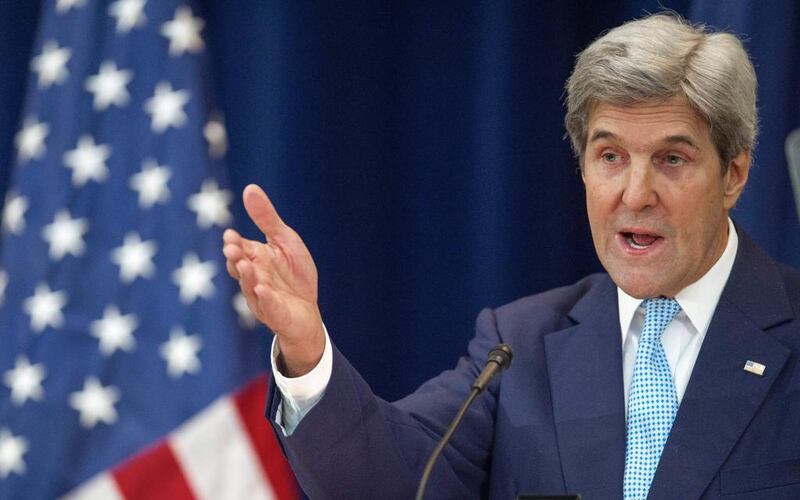JERUSALEM // Palestinians on Thursday welcomed US secretary of state John Kerry’s forceful condemnation of Israeli settlement activity but questioned the extent of its effect, coming just weeks before Donald Trump takes office.
The US president-elect has made clear he intends to support settlements.
“Thank you, but it’s too late,” said Issa Samander, head of the Land Defence Committee which organises protests against settlements in the West Bank. “We need bravery while in office, not when it ends.”
Ghazi Hamad, a Hamas leader in Gaza, added: “Kerry spent a long time as secretary watching settlement expansion and Israel destroying the peace process and did nothing. Did he just wake up after these years?”
An aide to Palestinian president Mahmoud Abbas welcomed Mr Kerry highlighting during his remarks on Wednesday that settlements were jeopardising Palestinian statehood, but took issue with other parts of his speech.
Palestinian differences with Mr Kerry include his not taking into account that there can be no equivalence between the Palestinian victim and the Israeli victimiser and his recognition of Israel as a Jewish state, said Husam Zomlot, strategic affairs adviser to Mr Abbas.
"I don't want to remark that this speech was positive or negative," Mr Zomlot told The National. "We have our reservations, but we are motivated more by the half-full than the half-empty."
“The most important part of Kerry’s speech was that there is a military occupation, including East Jerusalem as an occupied city, and that this must end,” he said.
Mr Kerry’s speech came five days after a US abstention enabled passage of a landmark security council resolution condemning Israeli settlements and declaring that they have “no legal validity”. The passing of the resolution by 14 votes out of 15 in the security council dealt a severe blow to the government of Israeli prime minister Benjamin Netanyahu.
Mr Kerry said hopes of a two-state solution, with a Palestinian state existing alongside Israel, were in “serious jeopardy” because of settlement building, incitement, violence and occupation. Nearly 600,000 settlers live in the West Bank and East Jerusalem, home to more than 2.6 million Palestinians.
He also specified that key elements of a peaceful resolution of the Palestinian-Israeli conflict should include:
• secure and recognised international borders between Israel and a viable and contiguous Palestinian state based on the armistice line that separated Israel and the West Bank before the 1967 war, with mutually agreed land swaps.
• a "just, agreed, fair and realistic solution" to the Palestinian refugee issue
• Jerusalem as the internationally recognised capital of the two states
• one Jewish and one Arab state, with mutual recognition and full and equal rights for all their respective citizens.
But Mr Zomlot took issue with recognising Israel as a Jewish state. “We will not recognise any state, including Israel, by religious definitions, colour definitions or race definitions. That will not happen. A state is a state for us.”
He also criticised Mr Kerry for appearing to apportion blame and responsibility to both Israel and Palestine. “In the middle of his speech, he kept saying both sides. There is a problem of equating between the victim and the victimiser, between the aggressor and those under occupation, between those who have engaged in ethnic cleansing all these years and those subjected to ethnic cleansing.
“You can’t equate incitement with bulldozing on a daily basis, annexing land and building new colonial settlements,” he said.
However, he praised Mr Kerry “for saying that settlements have nothing to do with security, that some of them are closer to Jordan than to Israel and that they are being built to jeapordise any possible Palestinian state.”
Mr Samander, the anti-settlement activist, said he had mixed feelings about Mr Kerry’s speech. “On the one hand what he said is good but at the same time we put our hands on our hearts fearing what will happen on the ground. We had good words from some administrations in the past but no change on the ground.”
He said that unless Israel ended the occupation, the Palestinians should go to the International Criminal Court to stop Israeli settlements. “We can’t wait for other nice words. And we have a chance after the Security Council resolution — no one can say the settlements are not illegal. Even the US has the same position now.”
Both Mr Samander and Mr Hamad said the Palestinians now needed to heal the rift between Fatah, which runs the West Bank-based Palestinian Authority, and Hamas, which rules Gaza. “The Palestinian strategy should be to end the split and work together to move the international community,” Mr Hamad said. “We have to unite to make our policies more effective.”
Ashraf Ajrami, former Palestinian Authority minister for prisoner affairs, said Mr Kerry “gave a balanced speech which concentrated on the main issues, especially the danger of settlements and danger to the two-state solution”.
“We must act with the international community to differentiate between settlements and Israel, between the occupied territories and Israel,” he said. “We need to have strong pressure on the Israeli government and at the same time speak with Israeli society to convince Israelis they can have a solution guaranteeing Israel’s security.”
Mr Zomlot said the focus would now shift to the January 15 Middle East peace conference convened by France that will bring together some 70 countries in Paris with the goal of reaffirming the necessity of a two-state solution.
“We want to create sufficient mechanisms to ensure that the international vision is implemented and international law adhered to, that there will be committees and follow up.”
He declined to be more specific, saying: “It’s best to keep things open for surprises.”
foreign.desk@thenational.ae





